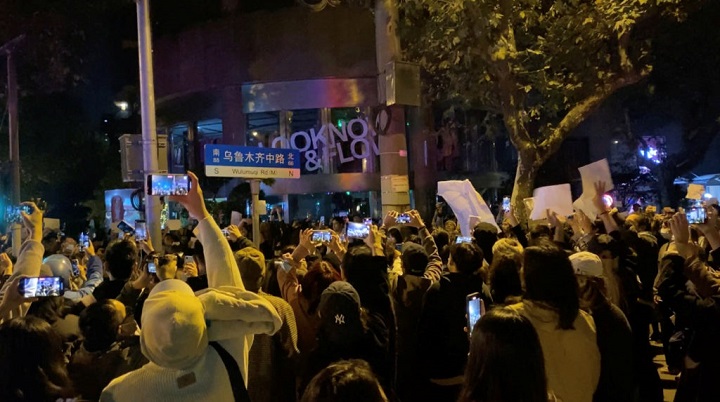
Currently, in China, many people feel glum and lack bright prospects to aspire to. But is it really a political problem? What can people do? [1]
A few scattered protests erupting in small cities will go unnoticed and disregarded. Such incidents have been occurring on a small or large scale for years without much attention. Unless there is a significant wave of demonstrations in multiple cities or major protests in Beijing or Shanghai, or even a violent uprising taking control of a city, the unrest can be easily brought under control.
However, an organization is required to have a wave of demonstrations or major protests in large cities, either through an extensive underground structure or with splits in the top leadership. At the moment, neither is apparent.
In December 2022, President Xi Jinping made a U-turn on Covid measures without thorough consultations. Last year, Xi replaced the foreign and defense ministers and purged the PLA’s top ranks without a party plenum or any opposition. These actions indicate that he has full control and there is no obstruction within the party or the state.
If Xi can maintain control, he may weather China’s severe and potentially long-lasting economic downturn. People will have to slowly adapt to worsening conditions and lower their expectations for the future. When faced with a first sudden hurdle, there may be initial resistance. Still, with Xi, this occurred in 2020 with the anti-Covid measures, which were widely accepted without struggle as people accepted the national effort against the disease.
People accepted the dramatic changes then, and after Covid, it became easier to implement various restrictions, with anti-epidemic measures easing up at the end of 2022.
The middle class appears to be a problem, but is it really? The value of their houses may be depreciating, but they still hold value; they may be unhappy about their losses but fear losing even more or everything. Once the process of gradual economic slowdown has started, as it has now, without significant upheavals, it could continue for years. The beginning is challenging, but people tend to go with the flow.
Some believe the middle class nurtures a possible revolution in China. It might be false. The middle class is actually an anchor of stability. They may complain, but they often refrain from taking any action out of fear of losing what they have.
It is the opposite for poor people; they may be content and not complain, but as they have little or nothing to lose, any opportunity can trigger social advancement. Hence, they can join in an explosion overnight, as was witnessed in 1989 with the Tiananmen protests or in 1999 with the demonstrations against the bombing of the Chinese embassy in Belgrade.
These considerations should lead to the understanding that a degree of social complaint is conducive to social and political stability, whereas no complaints can be more deceptive.
What will happen if the real estate market does not recover and foreign trade gradually shrinks, the two main growth drivers? The domestic market is already prepared, and the government will try to navigate through, gaining some space and growth on both fronts, although a breakthrough may not be unlikely.
This situation could continue for years unless a significant internal or external event alters the political dynamics. The ongoing wars present both an opportunity and a risk. They offer an opportunity to divert international attention from China, allowing Beijing to gain more room for maneuver. Still, they also pose a risk, as many things can go wrong in times of war and suddenly turn against Beijing.
Nevertheless, even if everything appears to be under control on paper, we are in uncharted waters when things are generally bad. If an economic downturn occurs, unexpected circumstances could arise. There is a 200-year cycle; the Ming and Qing dynasties collapsed because they could not manage their globalization crisis[2]. Now, China may face a similar challenge.
On the other hand, things may take a different turn if America, China’s main adversary, loses its nerve, becomes engulfed in internal conflicts, and gets entangled in various small and large fights. From Beijing’s perspective, it seems to be happening with Donald Trump’s controversial electoral campaign, wars in Ukraine and Gaza, and growing friction in Yemen. Then, chaos in America and the world would save China’s domestic troubles.
These factors present reasons for Beijing to remain cautious, observe the evolution of events, and prepare for possible outcomes.
[1] The article comes from a conversation with Anne Stevenson Yang, whom I thank here.
[2] See https://www.settimananews.it/informazione-internazionale/taxes-and-res-publica-for-china/, https://www.settimananews.it/informazione-internazionale/china-state-for-name/ and Jin Xu Empire of Silver 2022.






By Francesco Sisci
In response to a discussion with Richard Yarrow, whom I thank:
The Soviet leaders had lost faith in themselves and believed in the USA’s success. So, they fretted; the KGB was pessimistic and had promoted Gorbachev, looking for ways out of the trap where they were. Now China is confused but sees “Trumped” USA even more confused.
If Trump wins, the USA and the allies will be in confusion for years, and nobody knows what will happen to NATO, the EU, et cetera. Trump1 scrapped a deal in Asia to build a Free Trade Agreement excluding China; now nobody knows what he would do.
If President Joseph Biden is confirmed, Russia caves and the Gaza conflict stops, it will be a different matter for China.
In the late 1970s and early 1980s, the West established a new ‘cultural hegemony’ with Carter’s human rights and Thatcher-Reagan’s new liberalism. They first dented and then consumed belief in Soviet egalitarian communism, which led to confusion and disaster along with the Afghanistan defeat.
There’s nothing similar afoot in the West now. The new “trendy” idea in the West is a neo-authoritarianism modeled after Putin, Erdogan, or Xi. Then, Xi is trendy; why should he change? Trump looked up to him and looked down on Merkel!
The only effort for something different comes from Pope Francis, who is so despised and frowned upon by the ‘smart’ intellectuals of the West.
It’s a little like the world a century ago when Mussolini was fashionable and even many Jews were fascist.
Xi is in trouble, but are Western troubles less than his?
In response to Anne Stevenson Yang, whom I thank:
The 200-year cycle is roughly this: the Ming went into a crisis in the 1620 and 1630s and fell in 1644. In the late 16th century, they had a massive inflow of Spanish silver from Mexico via Manila (Spanish since 1571) that bought Chinese silk and porcelain. In the 1620s, the Thirty Years War started; the Spanish ran out of silver for silk, and without Spanish silver, the Chinese started hoarding silver; there was massive inflation, Li Zicheng rose, and the dynasty fell.
The Qing also started having troubles with English trade in the late 18th century; the McCarthy mission failed to fix it. In 1827, they held 70% of all global silver. They were choking trade, which had no more international currency to trade, and they were bringing the global economy to collapse. In 1840, the English started the first opium war, and soon, the dynasty went into a crisis, almost falling under the Taiping. Like 200 years before, when Ming loyalists called on Machu’s help, Qing loyalists called on foreign help (English and American mainly), whom foreigners equally rescued. Unlike the Manchu, who took over China this time, the Anglo-Americans didn’t try. Still, the dynasty didn’t survive for long.
Now, 200 years later, we are at a crossroads. China has a huge trade surplus, and its domestic market is closed. It is unsustainable for global commerce.
The three crises are different but have a common thread— China’s difficulty in positively joining trade and economy, which has been globalized since the discovery of America, and Magellan’s circumnavigation of the earth. This created unsustainable tensions that brought down the dynasty. Will it be the same this time?
Irrespective of the actual fall of the dynasty, the crisis all built up three times in the ’20s, 200 years apart. We are at the third crisis, this is sure, and we don’t know how it will evolve. We had two rebellions in the past, one picking up in the ’30s and one in the late ’40. Now, we don’t know if we’ll have a rebellion or anything.
By Robert Blohm
China’s leadership is already pointing to its vulnerability: criticism. As economic failure proceeds, so does repression. How much will people bear and how do they resist? Chinese are innovative: holding a blank sheet of paper (“I didn’t say anything!”), lying flat–try mobilizing that into voluntary labor brigades or driven fighting batalions. I disagree that the middle class accepts losing in order not to lose even more. North Korean Stalinism works when you’ve reduced people to being happy just to be alive rather than killed, and it’s kept on life support by a greater power. Democratic political disassembly is China’s leadership’s nightmare, but par for the course amid strong institutions and functional economies.